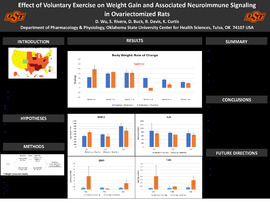| dc.contributor.author | Wu, D. | |
| dc.contributor.author | Rivera, S. | |
| dc.contributor.author | Buck, D. | |
| dc.contributor.author | Davis, R. | |
| dc.contributor.author | Curtis, K. | |
| dc.date.accessioned | 2020-05-05T19:38:08Z | |
| dc.date.available | 2020-05-05T19:38:08Z | |
| dc.date.issued | 2020-02-28 | |
| dc.identifier | ouhd_wu_effectofvoluntaryexerciseon_2020 | |
| dc.identifier.citation | Wu, D., Rivera, S., Buck, D., Davis, R., & Curtis, K. (2020, Feb. 28). Effect of voluntary exercise on weight gain and associated neuroimmune signaling in ovariectomized rats. Poster presented at Research Day at Oklahoma State University Center for Health Sciences, Tulsa, OK. | |
| dc.identifier.uri | https://hdl.handle.net/11244/324267 | |
| dc.description.abstract | Obesity is a multifaceted disease that poses a health care challenge, affecting ~40% of adults in the United States. It is associated with a range of co-morbidities and exorbitant medical costs. Obesity as a disease disproportionately affects different ethnic groups, as well as individuals of different socioeconomic status. However, the disparity between sexes is particularly concerning. 45% of women are obese compared to only 38% in men. Given this disparity, there is still surprisingly little literature on female obesity, even in animal models. It is known that ovarian hormones influence body weight, and that ovariectomized (OVX) rats rapidly gain weight. Additionally, it was noted in our previous study that this post-OVX weight gain is associated with regionally specific changes in neuroimmune signals in the CNS, particularly in areas involved in body weight regulation and feeding control, such as the arcuate nucleus (ARC), paraventricular nucleus (PVN), and the dorsal vagal complex (DVC). Obesity management is an issue as well. Due to its multifaceted nature, obesity is difficult to control. The most common recommendations for obese individuals are still dieting and exercise. In this study, we investigated the impact of exercise on weight gain along with the associated changes in neuroimmune signals focusing on Interleukin-6 (IL6), Monocyte Chemoattractant Protein (MCP-1), Toll-like Receptor 4 (TLR4), and Glial Fibrillary Acidic Protein (GFAP) due to their involvement in innate immune activation, which is associated with obesity. | |
| dc.description.abstract | Sixteen female adult Sprague-Dawley rats were OVX, with 8 then housed in cages with running wheels attached, while the other 8 were housed in standard cages without access to running wheels. Body weight and running distance were recorded weekly. At the 3-week mark, the rats were switched, with rats that initially were sedentary housed in cages with running wheels, and rats that had immediate access to running wheels transferred to standard cages. Rats were sacrificed at the end of the 6th week, and plasma, brains and spleens were collected. Punches were taken from ARC, PVN, and DVC and the expression of IL6, MCP-1, GFAP, and TLR4 were quantified using immunoblotting (IL-6, MCP) or ELISA kits (GFAP, TLR4). | |
| dc.description.abstract | OVX rats gained significantly less weight during their first week of running, regardless of whether they ran immediately or 3 weeks after OVX. Both TLR4 and GFAP in the DVC were significantly greater in the immediate exercise group, whereas IL-6 and MCP showed no differences between the two groups. Thus, exercise had transient effects to slow post-OVX weight gain, but was more effective when it was delayed for 3 weeks. With regard to neuroimmune signals, the effects of exercise were limited to GFAP and TLR4 and were regionally specific. Together, these findings suggest that exercise and the concomitant slowing of the post-OVX weight gain may reduce innate immune activation in hindbrain areas that respond to stimuli associated with feeding. | |
| dc.format | application/pdf | |
| dc.language | en_US | |
| dc.publisher | Oklahoma State University Center for Health Services | |
| dc.rights | The author(s) retain the copyright of have the right to deposit the item giving the Oklahoma State University Library a limited, non-exclusive right to share this material in its institutional repository. Contact Digital Resources and Discovery Services at lib-dis@okstate.edu or 405-744-9161 for the permission policy on the use, reproduction or distribution of this material. | |
| dc.title | Effect of voluntary exercise on weight gain and associated neuroimmune signaling in ovariectomized rats | |
| osu.filename | ouhd_wu_effectofvoluntaryexerciseon_2020.pdf | |
| dc.type.genre | Presentation | |
| dc.type.material | Text | |
| dc.subject.keywords | arcuate nucleus | |
| dc.subject.keywords | paraventricular nucleus | |
| dc.subject.keywords | dorsal vagal complex | |
| dc.subject.keywords | obesity | |
| dc.subject.keywords | neuroimmune signaling | |
